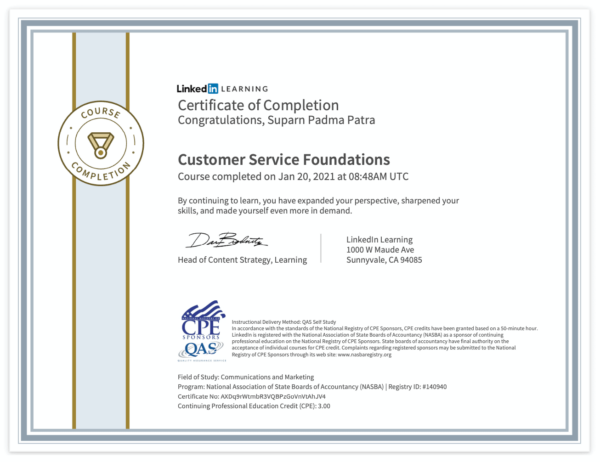Brief Information about Certification
Certification refers to the process of verifying the compliance of a product, service, or individual with a set of predefined standards or requirements. It serves as a formal recognition of quality, safety, or competence, providing assurance to users or consumers.
Detailed Information about Certification: Expanding the Topic
Certification plays a crucial role in various industries, ensuring that products meet established criteria for performance, reliability, and safety. It involves assessment by accredited third-party organizations or regulatory bodies, often through audits, testing, or documentation review. The process typically culminates in the issuance of a certificate, demonstrating compliance with applicable standards.
Detailed Analysis of the Key Features of Certification
Key features of certification include:
- Standardization: Certification is based on standardized criteria or specifications, which may be industry-specific or internationally recognized.
- Quality Assurance: It serves as a mechanism for quality assurance, enabling businesses to demonstrate their commitment to excellence.
- Consumer Confidence: Certification instills confidence in consumers, assuring them of the reliability and integrity of certified products or services.
- Regulatory Compliance: In regulated industries, certification is often mandatory to ensure compliance with legal requirements and safety standards.
Types of Certification
Certification can be categorized into various types based on the nature of the entity being certified. Some common types include:
| Type of Certification | Description |
|---|---|
| Product Certification | Ensures that products meet specified standards for quality, safety, and performance. |
| Service Certification | Verifies the adherence of service providers to established service delivery standards and protocols. |
| Professional Certification | Validates the skills, knowledge, and expertise of individuals in a particular profession or field. |
| System Certification | Certifies the effectiveness and compliance of management systems, such as quality management or environmental management systems. |
Ways to Use Certification
Certification serves diverse purposes across industries and applications:
- Quality Assurance: Businesses use certification to assure customers of the quality and reliability of their products or services.
- Compliance: Certification ensures compliance with regulatory requirements and industry standards, mitigating legal and operational risks.
- Market Access: Certification may be necessary for accessing specific markets or participating in government contracts that require certified vendors.
- Differentiation: Certified products or services often stand out in the marketplace, offering a competitive advantage over non-certified alternatives.
Problems and Solutions with Certification
Challenges associated with certification include:
- Cost: Certification processes can be expensive, particularly for small businesses or individuals seeking professional certification.
- Complexity: Navigating the requirements and procedures for certification can be complex and time-consuming.
- Validity: Ensuring the ongoing validity of certification may pose challenges, especially as standards and regulations evolve.
These challenges can be addressed through:
- Streamlined Processes: Simplifying and standardizing certification procedures to reduce costs and administrative burden.
- Access to Resources: Providing resources and support to help businesses and individuals navigate the certification process effectively.
- Continuous Improvement: Implementing mechanisms for ongoing monitoring and evaluation to maintain the relevance and validity of certification.
Main Characteristics and Comparisons
Comparison of Certification with Similar Terms:
| Term | Description |
|---|---|
| Accreditation | Process of formal recognition by an authority. |
| Compliance | Adherence to specified standards or laws. |
| Verification | Confirmation of accuracy or compliance. |
| Validation | Confirmation of the effectiveness of a process or system. |
Perspectives and Technologies of the Future Related to Certification
The future of certification is likely to be influenced by advancements in technology, including:
- Blockchain: Integration of blockchain technology for transparent and tamper-proof certification processes.
- Artificial Intelligence: Use of AI algorithms for automated assessment and validation of compliance.
- IoT (Internet of Things): Incorporation of IoT devices for real-time monitoring and data collection in certification audits.
How VPN Can Be Used or Associated with Certification
Virtual Private Networks (VPNs) can enhance the security and privacy of certification processes by:
- Secure Communication: Encrypting communication channels to protect sensitive data exchanged during certification audits or assessments.
- Remote Access: Facilitating remote access to certification resources and databases while maintaining confidentiality and integrity.
- Anonymity: Providing anonymity to users involved in certification activities, safeguarding against surveillance or unauthorized access.
Links to Resources for More Information about Certification
For more information about certification, you can refer to the following resources:
- International Organization for Standardization (ISO): www.iso.org
- American National Standards Institute (ANSI): www.ansi.org
- International Accreditation Forum (IAF): www.iaf.nu
These organizations provide comprehensive guidelines, standards, and resources related to certification processes and practices.


